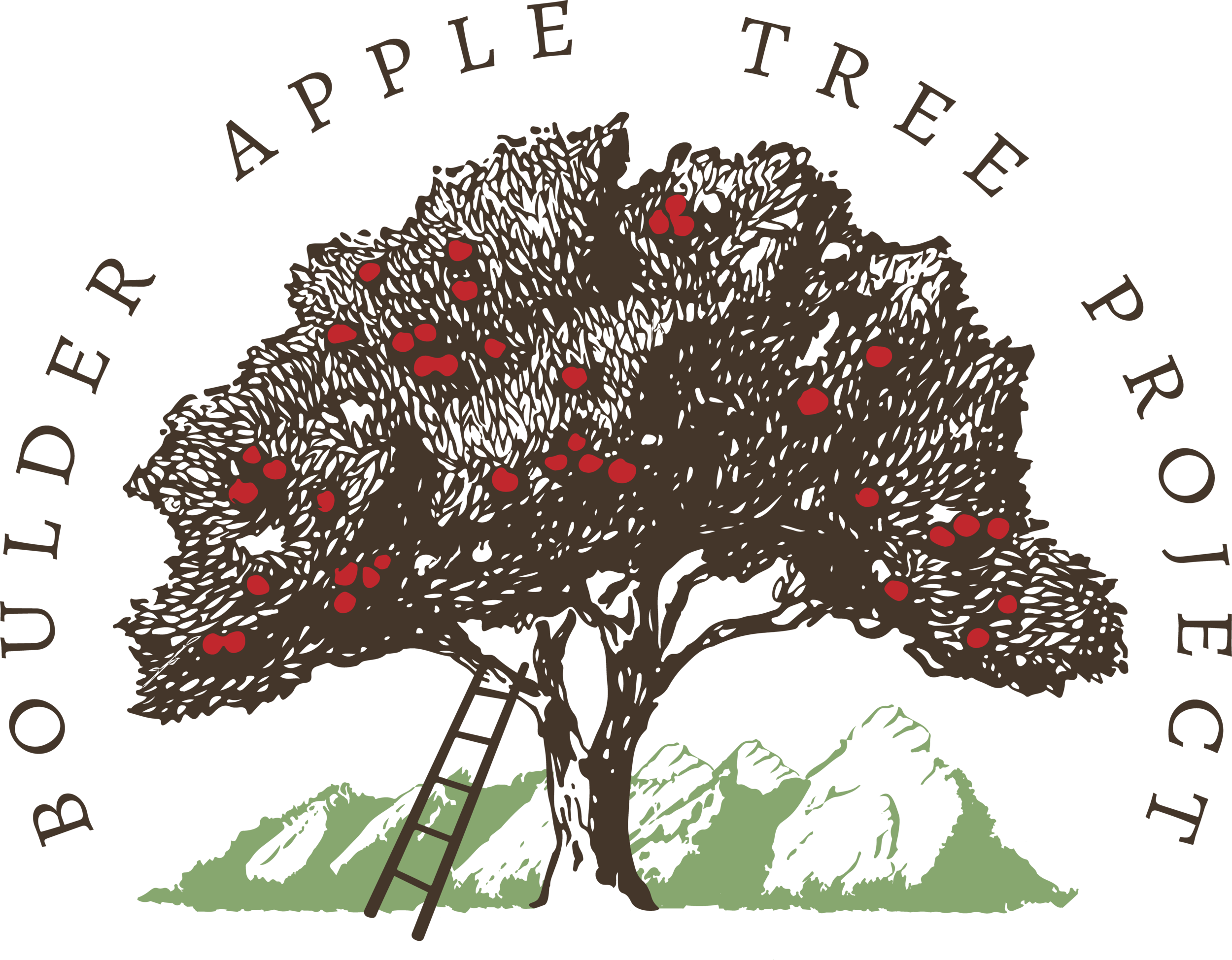Jennie Pruden History and CAS Guest Speaker
UROP students Eliza and Emily measuring apple trees in a Boulder neighborhood.
The Project’s History Team has been very busy this summer! Earlier in June, Amelia Brackett-Hogstad and Chance Nelson gave a lecture to the Indian Peaks Chapter of the Colorado Archaeological Society. The video can be found below!
Summer UROP History student, Emily Ray, has been researching the role of women and children in the apple history context. We hope that you will enjoy her study of Jennie Pruden:
Jennie Margaret Hogan Pruden
Jennie (Jenny) Pruden is a wonderful example of the importance of women in building of homesteads. She kept a daily diary throughout her life, and her record, starting in 1891 through to her death in 1946, survives to this day. From her entries and stories passed down through her descendants, we can see that her work was vital to the survival and prosperity of her family.
Charles and Jennie Pruden came to Colorado in 1882 with their infant daughter Odessa and Charlie’s widowed mother. They stayed with family in Golden where Jennie worked as a seamstress and Charlie did odd jobs to save up enough money to purchase their own land. They managed to scrape together 500 dollars, which, coupled with three mortgages, was enough to buy them a ranch just outside of Boulder. At that point there was no house on the land, just a stone barn where they lived for two years while they built a cabin.
Pruden Cabin Courtesy of Carnegie Library for Local History
They began construction on the house that still exists today in 1891. It was also during this year that Jennie and Charlie Pruden began to plant apple trees. Jennie’s diary reveals that one year, between 1891 and 1898, they planted 115 trees. It was plenty of work just to purchase and plant the trees, but the real challenge was irrigating them. Charlie built a ditch on the edge of their property to divert water from the nearby river, and every spring, they would flood irrigate the orchard. To ensure that the apple trees produced the most fruit possible, Jennie kept beehives. She was known for having just the right temperament to properly care for their numerous hives, which produced so much honey that they often took the surplus into Boulder to sell. For the most part, the Prudens lived off what they grew both in the orchard, which included many more types of fruit than just apple trees, as well as their vegetable garden. They also kept chickens, pigs, and cows. Jennie would go into town and trade the extra produce, honey, eggs, and meat, for goods such as flour and sugar.
Jennie Pruden and other local women in the Pruden wagon. Carnegie Library for Local History/Museum of Boulder Collection
In the fall months, Jennie described all the different activities around the ripe apples, from collecting them to cooking with them, and making cider. According to family historian Cherry Moore, the great-granddaughter of Jennie Pruden, “[The apples] were generally small - not bad tasting but not delicious. I mean they weren’t premium apples. With the exception, there was one tree out there. It was kind of like the tree in the Garden of Eden. It was a golden apple, and it sat right out there. And it was everyone’s favorite. Because it didn’t take long for all the golden apples to be consumed by someone. They were larger, very sweet, and that was the favorite of all the apples.” Aside from the “golden apples,” most of the produce went toward cider making. In 1922 the pruden family made 169 gallons of cider. The apple juice stayed fresh for about a week but after that time, they allowed it to ferment first into alcoholic cider and then into vinegar.
In 1904, the Moffat Road, a railroad route intended to connect the front range with western Colorado across the continental divide, was built very close to the Prudens’ farm. They turned their home into a boarding house for the railroad workers, which became quite the commercial enterprise for the family. In addition to her usual duties of caring for the animals, gardening, managing the orchard, cleaning, and cooking, Jennie took on the task of cooking for about 15 to 20 men per meal and doing all of the laundry by hand.
Eventually, Charlie and Jennie’s daughter married and she and her husband, Ted Moore, began to take more responsibility for caring for the farm. Charlie’s mother had moved out to San Diego and remarried so the Prudens became some of the first, so called, “snow bunnies” who moved back and forth between the warmer climes of California in the winter and the cooler mountain summers of Colorado. They moved to San Diego permanently in 1926, where they also planted apple trees. After Charlie’s death in 1940, Jennie moved back to Colorado to live with her daughter who died shortly after Jennie’s arrival. She was physically active in helping Ted run the ranch until Jennie’s death in January of 1946 at age 83. The property was divided but kept among family members, it is one of the few properties in Boulder County that has been continuously owned and occupied by descendents of the original family. Part of the land was also sold to Open Space. There are still a few apple trees on the property, which were very likely planted by Jennie and Charlie Pruden that have survived for over 125 years.




